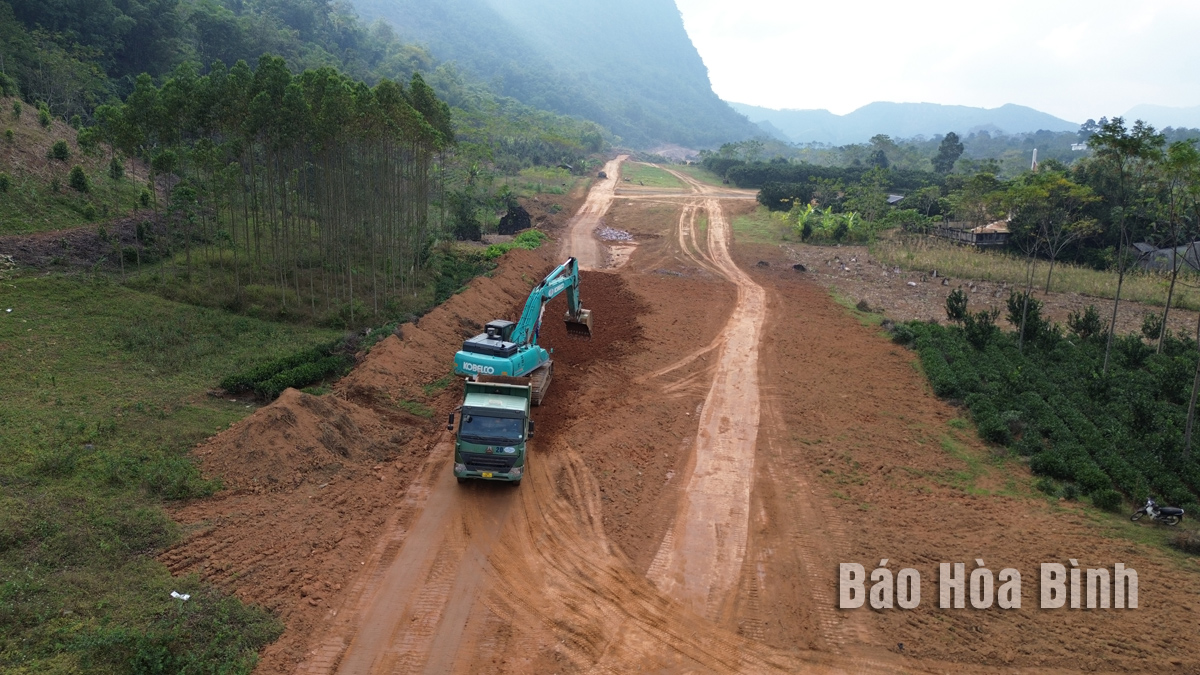



Hoa Binh – Moc Chau Expressway under construction. The provincial government promptly issued a land price framework, facilitating site clearance for businesses.
Shortly after the law's enactment, the provincial People's Committee issued Plan No. 98/KH-UBND on May 8, 2024, outlining steps for its implementation. Alongside this, key resolutions were passed, including Resolution No. 448/2024/NQ-HDND of the provincial People's Council, which details land-related support for ethnic minorities, and Resolution No. 436/2024/NQ-HDND, which sets criteria for selecting investors through public bidding.
The provincial People's Committee also introduced important decisions in a timely manner such as Decision No. 31/2024/QD-UBND, which covers compensation, support, and resettlement during land revocation, and Decision No. 64/2024/QD-UBND, which outlines vocational training and career transition support for individuals affected by land revocation. These measures provide a solid legal foundation for protecting citizens' rights and improving land management efficiency.
The numerous online and in-person seminars have been conducted by the natural resources and environment authorities to disseminate the new Land Law and its associated decrees. Notably, an online conference on May 10, 2024, with officials of the Minsitry of Natural Resources and Environment (MonRE) and provincial agencies among participants, helped further spread key provisions of the law.
In addition, creative approaches have been implemented to raise public awareness, such as publishing materials, posting articles in local media, and organising workshops. These efforts have helped raise public awareness and improve coordination among managerial agencies in law enforcement.
A list of administrative procedures related to land issues have been announced and approved for implementing the inter-sectoral single-window mechanism. Decision No. 1615/QD-UBND, issued on August 22, 2024, has further facilitated access to public services for both citizens and businesses.
While progress has been made, the implementation of the Land Law has encountered challenges, particularly due to the large volume of work involved.
With over 20 areas of decentralised authority, developing detailed regulations has put significant pressure on both timelines and human resources.
Additionally, the number of civil servants specialised in land management remains insufficient, which makes complex tasks such as land valuation and land use planning difficult to execute. Some policies also affect multiple groups, requiring extensive consultation and development, which prolongs the implementation process.
To address these challenges, the natural resources and environment sector has recommended the provincial People's Committee propose the Government amend Decree No. 102/2024/ND-CP to allow district-level land registration offices to operate more efficiently. It has also suggested the MonRE hold additional training and give detailed guidelines to handle complex issues such as building a land price framework.
Through persistent efforts, Hoa Binh is laying a strong foundation for the successful implementation of the 2024 Land Law. While challenges remain, the province's determination, along with the support from local people, promises a positive outcome in the near future.